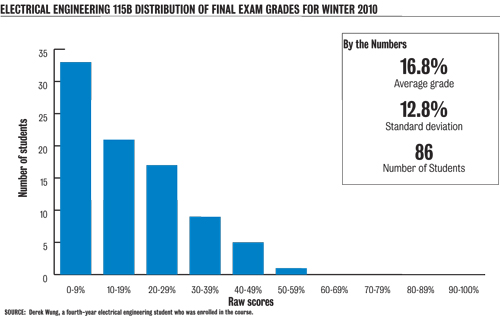Eighty-six students took an upper-division electrical engineering course during winter quarter. One student received a B-plus. Eighty-five students received a C, D or F.
The poor performance was the fault of the professor, said Kavoos Hedayati, a fourth-year electrical engineering student who was enrolled in the class.
He said there was not adequate preparation for the exams, claiming the final was so difficult that even graduate students had trouble completing it.
“The professor can grade however he wants, but that’s not fair,” Hedayati said.
The professor of the course, Asad Abidi, said he is unsure why there was such poor performance. He said it was a random event, and likened it to having a hailstorm in Los Angeles. In fact, Abidi said less material was covered in this course compared with the curriculum of previous years.
“If I had an explanation, I’d be a lot happier about it, but I really don’t,” Abidi said.
For future classes, Abidi said he will track students’ progress closely, and added that he hopes this situation won’t happen again.
Dissatisfied with their grades, students who took Electrical Engineering 115B created a Facebook group and organized departmental meetings railing against what they believed to be an unfair outcome.
Then, near the beginning of spring quarter, about 30 students met with academic department heads to discuss the matter, said Derek Wung, a fourth-year electrical engineering student who attended one of the meetings.
Shortly after meeting with the department, on April 20, the class received an email from Abidi.
“Over the years our undergraduates who chose the circuits pathway have stood out in their understanding of the subject,” Abidi wrote in the email.
However, Abidi’s most recent class had the worst grade distribution of any he has taught in the last 10 years, he said.
As a gesture to his students, Abidi outlined options for grade alteration. He granted the ability to retroactively change the grading scale to pass/no pass or to retake the class. Abidi said student performance was much lower than expected, and in the email he expressed a sentiment that these options were giving students the ability to better master the material.
“We all agree that a longer exposure to circuits should help most of you achieve the competence level with which you will be happy, and that will maintain the department’s tradition,” Abidi said in the email.
Students were given until May 3 to decide what they wanted to do. Abidi said he had never before extended options like these to students.
Hedayati received a C- in the course, which would result in a “no pass” if he decided to change the grading option. He said that, as a result, he decided to choose a different electrical engineering pathway, and would never pursue electrical circuitry again.
Electrical engineering chairman Ali Sayed, one of the department heads who was involved in meeting with students, said the grading in the course remained intact.
“The integrity of the grading process is being respected,” Sayed said. “It is a solution to help the students master the material better.”
Normally, the electrical engineering department only offers the course once a year, but in a move to make retaking the class more viable, the department has decided to offer the course in both the fall and spring quarters of the 2010-2011 school year, Abidi wrote in the email.
For Wung, retaking the course is not an option. He said that, as a graduating senior, he does not have time to retake the class as that would result in postponement of graduate school. Most of the students in the class were fourth-year students, Wung added.
The electrical engineering department heard students’ concerns and outlined potential solutions to Abidi, said Rick Wesel, associate dean of the department.
“If there are students that are unhappy, they should probably talk to professor Abidi, or talk to the chair, or talk to us,” Wesel said. “I think that certainly it appears that professor Abidi has heard the concerns of the students and tried to give them some options.”
A number of students in the class who were contacted by phone and email declined to comment or could not be reached.

Another shining example of UCLA advertising its status as a “top public research university” while riding on the wallets of its undergraduates. No surprise, UCLA sided with a tenured professor.
Credit to the author for the good journalism and presenting the facts without offering opinion or bias.
University of California system is over-rated and over-hyped and over-paid. Their research is often heavily publicized even if it does not have much international impact. Overall they are a good university system.